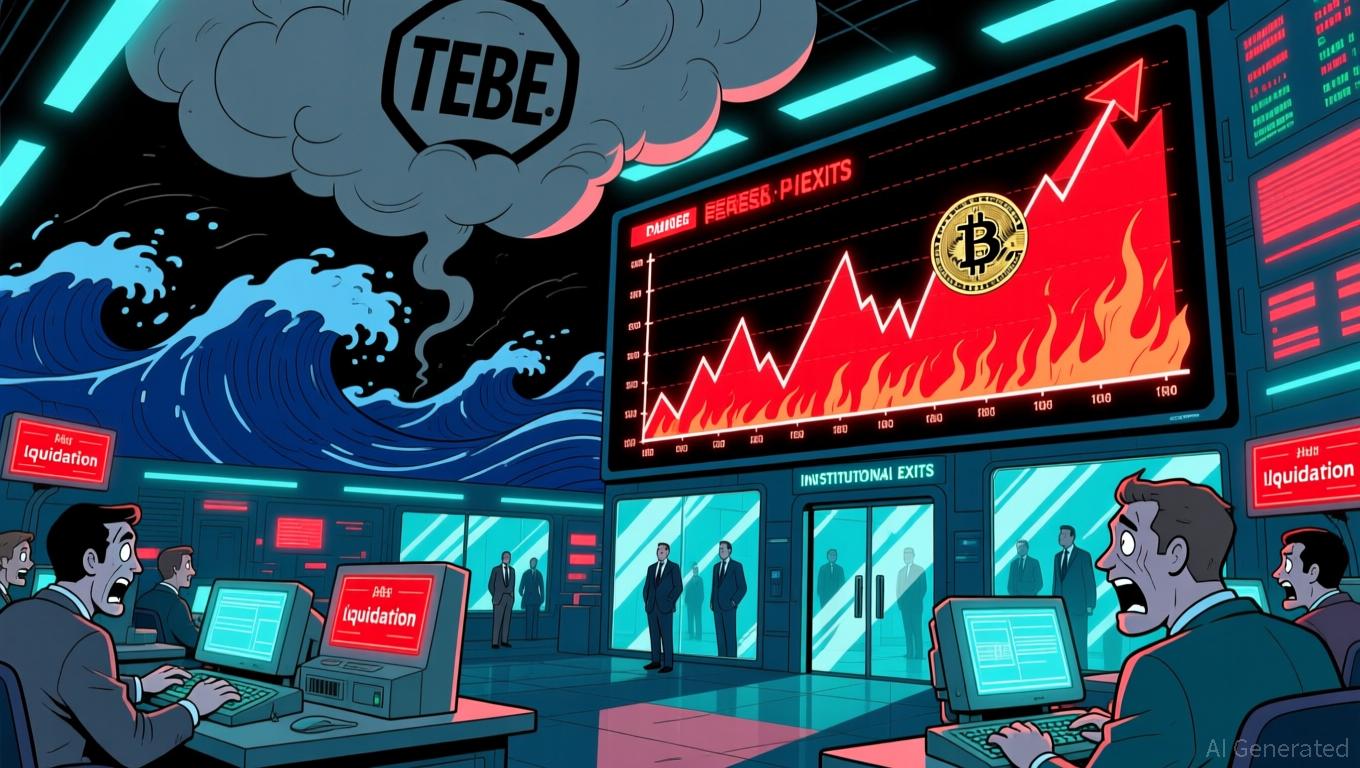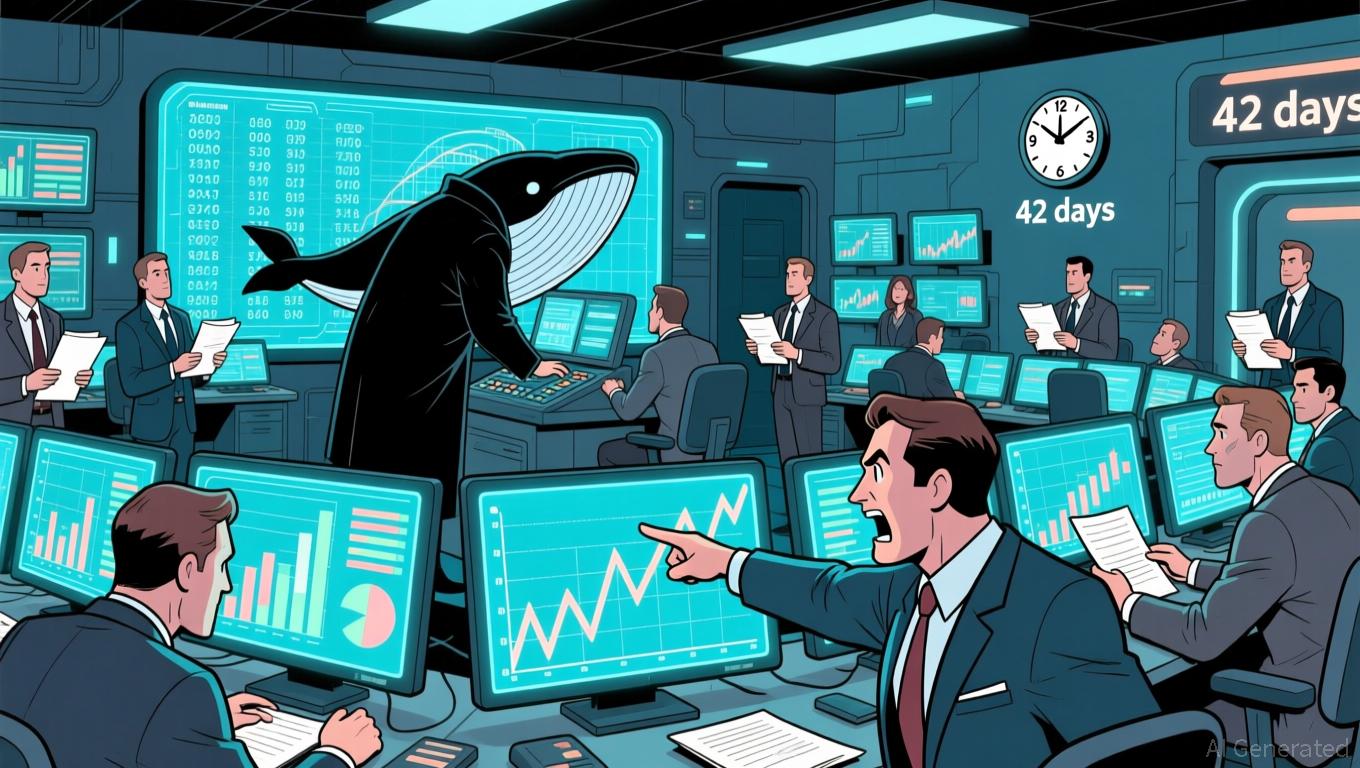Zcash News Update: The Strength of Privacy and the Risks of Hype—Zcash’s $13 Billion Bet on Market Speculation
- Zcash (ZEC) fell 30% from its $750 peak, with analysts warning of structural risks in its 1,460% parabolic rally. - Price patterns resemble BNB's pre-crash, with key support at $220–$280 and a potential $282 target by 2026 if broken. - High mining profitability and hash rate growth raise concerns about hardware-price scissors risks and 51% attack vulnerabilities. - Weak on-chain activity (15k–18k daily transactions) and low shielded transaction volume question its $13B valuation sustainability. - ZEC rem
Zcash (ZEC) has dropped 30% since reaching its November high of $750, raising fears of a steeper downturn as experts highlight underlying vulnerabilities in the privacy coin’s recent explosive rally. After soaring 1,460% in just two months, ZEC is now trading around $630, with technical charts, blockchain data, and overall market mood sending mixed messages.
ZEC’s recent price movement has been likened to BNB’s pattern before its crash, with trader NebraskanGooner pointing out signs of “parabolic exhaustion” on the daily chart.
Profitable mining has driven ZEC’s hash rate higher, with the Z15 Pro miner offering an 89-day payback and an annualized return of 410%—a figure rarely seen in proof-of-work history. However, this has sparked concerns about a possible “hardware-price scissors” effect, where a sharp price decline could make mining unprofitable once hash rate peaks. ZEC’s network hash rate—comparable to a medium-sized
Despite ZEC’s price rally, on-chain usage remains subdued, with daily transactions averaging only 15,000–18,000 and shielded transfers making up less than 10% of all activity. This gap between price and actual use has led some analysts to doubt whether the token’s $13 billion fully diluted valuation can be justified. “ZEC’s surge is fueled by speculative FOMO rather than genuine adoption,” said Lacie Zhang from Bitget Wallet.
ZEC’s price continues to closely track Bitcoin, which has dropped 19% since late October amid global economic uncertainty. “When Bitcoin drops,
Although crypto veterans such as Arthur Hayes and Tyler Winklevoss remain optimistic about ZEC’s long-term prospects, citing its pioneering role in zero-knowledge proofs, the short-term outlook is clouded by immediate risks.
ZEC’s future depends on Bitcoin’s stability, regulatory shifts, and whether its core fundamentals can support its high valuation. For now, the coin faces a pivotal moment: Will it recover its parabolic uptrend, or will the $200–$300 range become its new norm? As one analyst put it, “ZEC’s journey serves as a warning—privacy is its strength, but hype is its Achilles’ heel.”
Disclaimer: The content of this article solely reflects the author's opinion and does not represent the platform in any capacity. This article is not intended to serve as a reference for making investment decisions.
You may also like
Bitcoin News Update: Tether’s $5.7 Million Investment Shows Support for Rumble’s Shift Toward Crypto-Based Cloud Services
- Tether boosted its Rumble stake by $5.7M, buying 1.06M shares to signal confidence in the firm's cloud-crypto integration strategy. - The investment follows Rumble's Northern Data AG acquisition, expanding its GPU capacity and data centers for crypto infrastructure growth. - Tether agreed to $250M in GPU purchases and advertising, while Rumble's Bitcoin tipping features and $18.5M BTC reserves reinforce crypto alignment. - Rumble's stock surged 13% amid market optimism, though analysts maintain a "Hold"

Bitcoin News Update: Fed's Balancing Act: Crypto Crash Highlights Market Vulnerability
- Bitcoin fell to $82,605, its worst monthly decline since 2022, driven by Fed policy uncertainty, institutional outflows, and macroeconomic pressures. - Record $3.79B ETF outflows and $120B in crypto liquidations highlight waning confidence, with leveraged positions collapsing amid weak U.S. employment data. - Deutsche Bank and BofA's Hartnett warn of a "liquidity event," comparing the crisis to 2018, as stalled regulations and thinning liquidity expose market fragility. - Analysts debate a potential rebo

Undisclosed Repayment Provision Sets Brevan Howard in Opposition to Berachain
- Brevan Howard secured a $25M refund clause in Berachain's $142M Series B, allowing recovery if BERA token underperforms within a year. - The SAFT-linked mechanism requires $5M deposit post-TGE, creating liquidity risks if Berachain must repay $25M by 2026. - BERA's 67% price drop to $1 raises doubts about clause viability, while legal experts call such terms "extremely rare" in token financing. - The undisclosed clause highlights tensions in crypto VC structures, potentially setting precedents for prefer
XRP News Today: The 2017 Surge of XRP Faces Off Against Today’s Market Conditions
- Analyst Steph Is Crypto notes XRP's 2017-like price patterns, including Gaussian channel breakouts and 42-day corrections, suggesting potential for a "massive" upward move. - Whale accumulation of $7.7B XRP and new ETFs (e.g., Franklin Templeton's XRPZ) signal institutional confidence despite recent price dips below $2.00. - Technical indicators show bullish RSI divergence and critical support at $1.90-$2.06, but liquidation risks and whale sell-offs ($480M in 48 hours) highlight volatility. - Regulatory
